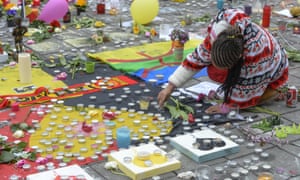
We are pained and heartbroken by the devastating tragedy in Brussels. Our thoughts and prayers are with the families of those killed and wounded. However, to state that we are not at war (Editorial, 23 March) is disingenuous. We must distinguish between 1.6 billion Muslims – the overwhelming majority of them decent, peaceable and law-abiding – and those affiliated with irreligious terrorism. Muslims cannot bear responsibility for the actions of a few lunatics, bent on sowing the seeds of religious animosity and social discord; exactly as Christians cannot bear responsibility for their governments selling armaments to dictatorships across the world, and bombing civilians under the rubric of democracy; and exactly as Jews cannot be held hostage for the reluctance of the Israeli government to abide by international humanitarian law in the occupied Palestinian territories, Syrian Golan Heights and Lebanese Shebaa farms.
We are at war with radicals, irrespective of their colour, religion and ethnicity. Right now, what is needed is nothing short of a collective wisdom to correct the wrongs of centuries of foreign meddling in the internal affairs of sovereign lands, combat social and political marginalisation, and build a fair world for all.
• Here in London our mayoral candidates are in a bellicose bidding war to back armed police who shoot to kill terrorist suspects. So far two armed counter-terrorism operations in the capital have resulted in Jean Charles de Menezes being killed in 2005 and Mohammed Abdul Kahar being wounded in 2006, neither being terrorists. At the time mayor Ken Livingstone was steadfast in refusing to countenance any criticism of the police over either of these catastrophes. The sad lessons of this approach seem to have been forgotten.
Worse still is that even when a shoot-to-kill police policy targets real terrorists, as the Belgian police did, it doesn’t stop atrocities any more than shoot-to-kill in Northern Ireland stopped IRA “spectaculars” in the City and Docklands.
Nik Wood
London
• In these dark days for Europe it might help if we remember that at one time the IRA were the equivalent of Isis, and the UK did not close its borders to Irish people. In fact, the UK and Ireland had freedom of travel long before it became the norm in the EU. And many Irish, including me, made a life in the UK.
This is not a rose-tinted “Why can’t we all get along?” letter. I remember anti-Irish sentiment but thankfully I never really experienced that. I know I was a lucky one.
Years after the Hyde Park atrocity I met an ex-Horse Guard at a party in London. He spoke of his love of Ireland and his visits to friends who loved horses. This man had many reasons to see me as an enemy but he did not.
The EU now faces the same type of threat that the UK did (and continues to now from a new group bent on violence). I urge them to respond as our two countries with darkly violent histories did and to keep our borders open, to keep a light on in the window. It took decades for us to build this peace that still stands. My son has lived all his life in this peace, for which I am very grateful.
With respect and love to the families of victims.
Peter Nolan
Drogheda, Ireland
• Tuesday’s terrorist attacks in Brussels come as no surprise; they are part of the wars fought in the Middle East for years, wars in which we are participants. Wars of which moderation is a casualty and radicalisation and extremism the dominant ideologies. Hardliners have prevailed, while moderates are marginalised and silenced. The prevalent narratives are now the hegemonic and the counter-hegemonic.
Hope is another casualty. The most frequently asked question on Iraq, for years, has been: “How can the war end?” So many are looking for the answer, the solution, the path to peace. Yet now, more than ever, no answer can be given. The continuing struggle for hegemony, the battle of interests and the battle of rival identities are once again raging, as hope is slowly dying, along with thousands of innocents.
The question now is: “How many more people, dreams and ideals will be sacrificed at the altar of this power struggle?” Whether moral, immoral or amoral, these wars have resulted in an endless cycle of violence, recriminations, enmity, suffering and death. The hard and discourse wars have mutually reinforced each other, co-constituting a political reality we all have to live in, preventing, rather than facilitating the search for solutions.
Dr Lily Hamourtziadou
Senior researcher and analyst, Iraq Body Count
• In light of the Brussels attacks it does occur to me that there is a level of hypocrisy when it comes to violence in our society. We immediately look to blame religion and in particular Islam, but violence and warfare is a popular ingredient of so many television shows, video games and films. London Has Fallen and Call of Duty are just two titles that spring to mind. Of course, these are not the sole cause of terrorist attacks, but when weaponry and the use of force is glorified in popular culture, it is not surprising that damaged young people disaffected from mainstream society turn to violence as a kind of redemption.
Paul Severn
Milton Keynes, Buckinghamshire
• Deborah Orr inveighs against “the manufacturers and retailers of hate and death and tragedy”, meaning groups of terrorists (Apologies and imperialism are never the right answers to terror attacks, theguardian.com, 22 March), like the recent ones in Paris and Brussels. And she intends to suggest ways to peace.
According to Wikipedia, the countries exporting the most weapons are: the US, Russia, China, France, Germany, the UK, Israel and Spain. Shouldn’t they be included among the “manufacturers and retailers of hate and death and tragedy”?
Ms Orr overlooks the fact that weapons, together with their delivery and “security” systems, are the ideal product for a capitalist economy. Firstly, because there is in practice no limit to how many can be “consumed”. One can, for example, carpet-bomb two countries three times or three countries twice. Secondly, there is also no limit to how much more sophisticated weapons can become. So, given the latest model, armies feel they need to carpet-bomb again.
As I understand it, it was during the first world war that the arms industry (and the banks) became aware as never before that the profit from war is greater than the profit from peace. There was a relative hiatus after the Great War but, since the second world war, conflict has been continuous. And wars between countries have been supplemented by wars on drugs and on terrorism. It is consequently unrealistic to hope for peace. The powers that be mention the word from time to time and organise talks in Geneva. But the fact is that there is too much money to be made from conflict for a capitalist economy ever to want to end it.
Norman Coe
Sant Cugat del Vallès, Spain
• Europe has helped almost a million Syrian refugees who have escaped fromSyria. Where is the recognition? Where is the acknowledgment? Where is the gratitude? Over 30 dead in Brussels. Stop being an apologist for Islamic terrorists masquerading as an honest broker. There is no terrorist group to have dialogue with. Who are they? Do you have their mobile number? Deborah Orr perpetuates the myth that the cause of Belgium was western imperialism and in so doing acts as an apologist for the murderous scum who perpetuated it. To misquote George Orwell: Muslim good, west bad.
Neil Sinclair
Edinburgh
• The carnage and bloodshed of the Brussels bombs is, of course, sickening and shocking. But then the carnage and bloodshed caused by allied bombing and drone strikes in Syria and Yemen doubtless look equally sickening and shocking at ground level, and cause a similar number of innocent civilian deaths. But we never see those beamed to our TV screens and picked over in endless analysis recognising the loss of innocent Arab civilian lives is as tragic as those in Brussels.
Norman Miller
Brighton
• So sad what has happened in Brussels. But does nobody realise that we are giving the terrorists exactly what they want – endless publicity about what they have achieved and the creation of great fear right across Europe. No time for any other world news – terrorists are now the most important people.
Joan Carter
Torrington, Devon
• There is still a much higher risk of being killed or injured when getting into a car than by an attack by terrorists. It is important that we keep a sense of perspective, keep calm and carry on, otherwise they are winning. Fear was not in Churchill’s vocabulary.
[Source:- The Guardian]




